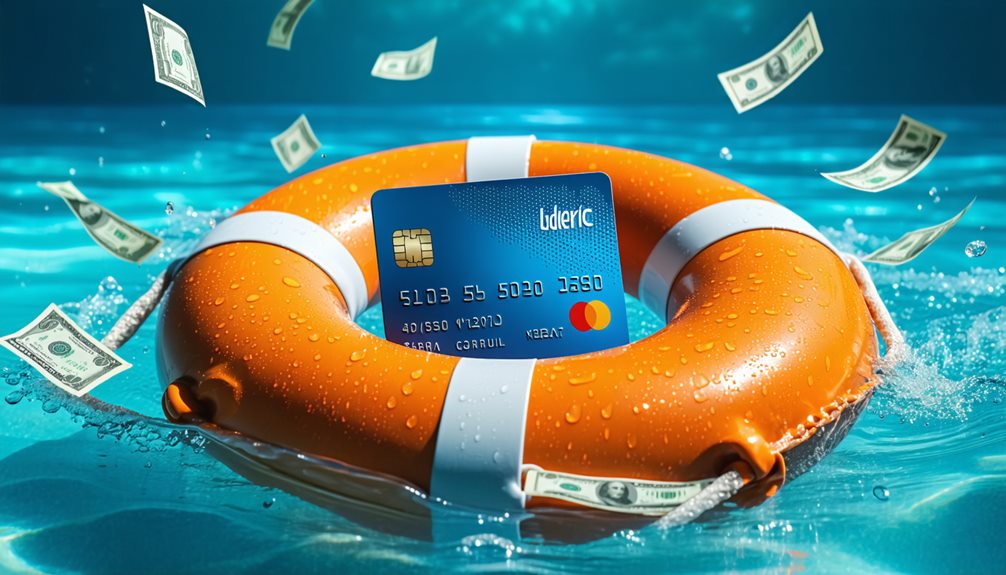To avoid falling back into credit card debt, it's important to use simple strategies that help keep your finances stable.
First, create a realistic budget. This will make sure you cover important expenses while also saving money.
Keep track of what you spend to see your spending habits clearly. Use cash or a debit card instead of credit cards to reduce the urge to spend money you don't have.
Having an emergency fund can help pay for unexpected costs without using a credit card.
Also, knowing what makes you want to spend impulsively can help you control those urges.
How can you use these strategies to stay debt-free?
Key Takeaways
- Create a practical budget to focus on essential expenses and savings goals.
- Keep track of your spending with budgeting tools to watch spending habits.
- Use debit cards or cash instead of credit cards whenever possible.
- Save up an emergency fund to avoid using credit during tough times.
- Recognize and control what makes you spend emotionally to avoid impulsive buying.
Set a Realistic Budget
How does someone take the first step toward financial freedom? Setting a realistic budget is a crucial first step in this journey. A realistic budget gives a clear picture of one's financial situation and helps with decision-making that matches both savings goals and necessary expenses. By recognizing the need to prioritize, people can create a plan that not only covers daily needs but also prepares for future goals.
Creating a budget starts with identifying essential expenses. These are the non-negotiable costs—like housing, utilities, and groceries—that keep life running smoothly. Once these are clearly defined, it's easier to set aside money for savings goals. This method ensures that while immediate needs are met, there's also progress toward bigger financial goals, whether it's an emergency fund, a dream vacation, or retirement planning.
Being part of a group with similar financial goals can strengthen one's commitment to sticking to a budget. Sharing experiences, exchanging tips, and celebrating milestones together create a sense of belonging.
In the end, a realistic budget is more than just numbers; it's a guide to financial well-being and a supportive community mindset.
Track Your Expenses
Tracking your spending is important for controlling your personal finances. By keeping track of what you spend, you can become more aware of your financial habits and find areas where you might be spending too much.
Budgeting tools and financial apps can make this easier. They help you see your spending patterns and sort your expenses into clear categories. These tools often offer different ways to track your spending, like entering it manually or automatically syncing with your bank accounts.
Reviewing your expenses every month is a good habit. It lets you think about your financial actions and change your spending if needed.
Limit Credit Card Use
Why should someone limit their credit card use? Limiting credit card use can help people keep their finances stable by preventing high-interest debt from piling up. Using credit cards too much often leads to spending more than one can afford, which starts a hard-to-break cycle.
Being part of a community that values financial responsibility can encourage careful spending and ensure that purchases match both needs and long-term goals.
Looking into credit card alternatives is a smart move. Using debit cards or cash can help control spending because they take money directly from available funds, which lowers the temptation to spend too much.
Prepaid cards are another option, allowing people to manage their budgets well without the risk of getting into debt.
Mindful spending isn't just about spending less; it's about making thoughtful choices. By focusing on what's necessary and prioritizing experiences that create a sense of community, people can enjoy life without financial stress.
Social gatherings, community events, and activities with others often bring more happiness than owning more things.
Build an Emergency Fund
When unexpected expenses come up, having an emergency fund can help prevent financial stress and keep you from piling up credit card debt. An emergency fund acts like a financial safety net, giving people peace of mind and a sense of security.
Setting up emergency savings means putting money aside only for unexpected events, like medical emergencies or car repairs. This plan not only ensures financial security but also encourages responsible financial planning.
Building an emergency fund takes consistency and discipline. It's important to start small by setting aside a manageable part of your income each month.
Over time, these small contributions can grow into a significant cushion that can help you when life throws you a curveball. This smart strategy helps you avoid the temptation to use credit cards, which can quickly lead to debt.
For those looking to feel connected within their financial community, sharing tips and successes can create supportive environments.
Encouraging others to prioritize emergency savings strengthens everyone's resolve against financial problems. By keeping financial security through an emergency fund, you not only protect yourself but also help build a culture of financial well-being and resilience.
Understand Spending Triggers
Having an emergency fund is crucial for financial stability, but it's also important to understand what makes us spend money. Emotional spending often happens during stressful times, leading to impulse buys that might make us feel better for a short while but cause money problems later. Noticing these habits is important.
Social influences, like wanting to keep up with friends' spending, can also push us to spend more. This can lead to lifestyle inflation, where we spend more as we earn more.
We can't ignore the power of advertising either. Companies create ads that make us think buying something will make us happy. Learning about finances can help us spot these tricks and avoid spending when we don't need to.
Understanding spending triggers means looking at both outside influences and our own reasons for spending. By identifying these triggers, we can create personal plans to manage them, like setting clear money goals or making a budget that fits our values.
Being part of a group with similar financial goals can also provide support and help us stick to good money habits, creating a sense of belonging in responsible financial practices.
Frequently Asked Questions
How Do Interest Rates Affect My Credit Card Debt?
Interest rates have a big impact on credit card debt. When rates are high, your monthly payments go up, making it tougher to pay off what you owe. To manage debt effectively, focus on paying off the balances with the highest interest first. It's also important to budget carefully and look into options with lower rates to make things easier on yourself financially. Additionally, seeking support from your community can be helpful.
What Are the Benefits of Consolidating Credit Card Debt?
Consolidating credit card debt makes it easier to manage your debt and plan your finances. It can lower interest rates, reduce monthly payments, and make things clearer. This approach helps people feel more in control of their finances and connected with others who are also working towards financial stability.
How Can I Negotiate Lower Interest Rates With My Credit Card Issuer?
To begin negotiating a lower interest rate, she should call her credit card company, mention her good payment history, and ask for a reduced rate. Being polite and persistent can improve her chances of getting a better deal.
What Role Does Credit Score Play in Managing Credit Card Debt?
Having a good credit score helps manage credit card debt by lowering the interest rates you have to pay and giving you better terms. If you use too much of your credit, it can hurt your score. So, it's important to keep your balances low and make payments on time to stay financially stable.
Are There Any Debt Relief Programs Available for Credit Card Debt?
Debt relief programs offer ways to manage credit card debt, like financial counseling and budget planning. They help people learn about money management, guiding them to develop better financial habits. These programs also create a supportive community, which can make people feel included and empowered.
Conclusion
By creating a realistic budget, keeping track of expenses, and reducing credit card use, people can avoid falling back into debt. Saving for an emergency fund offers a safety net for unexpected costs. Knowing what triggers spending can help manage emotional buys. Using these strategies, people can stay financially stable and be part of a community that focuses on responsible spending. Sticking to these habits ensures long-term financial health and avoids the dangers of credit card debt.




